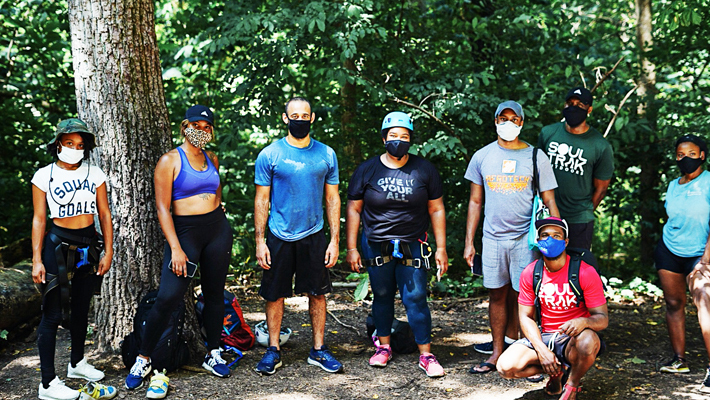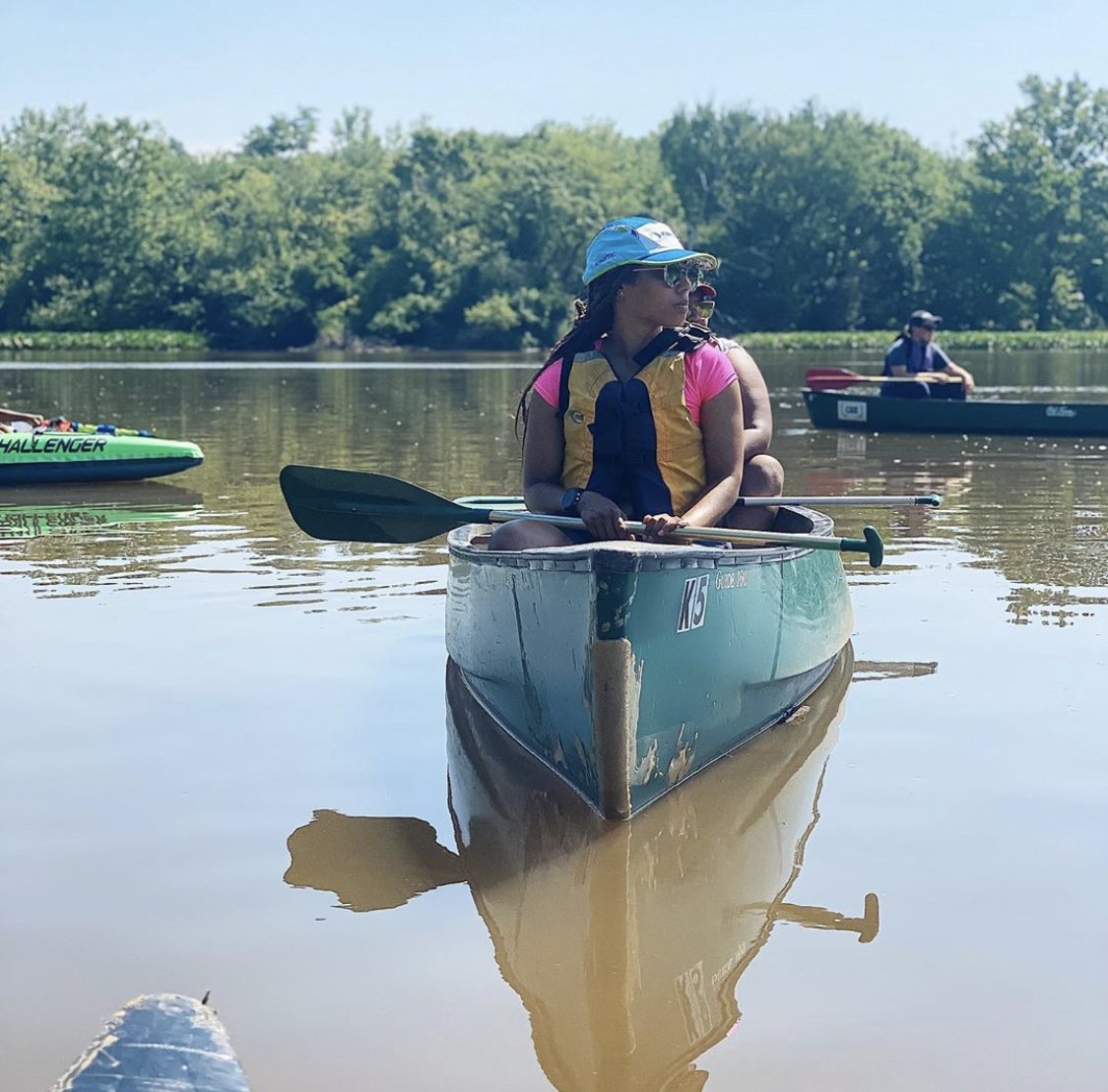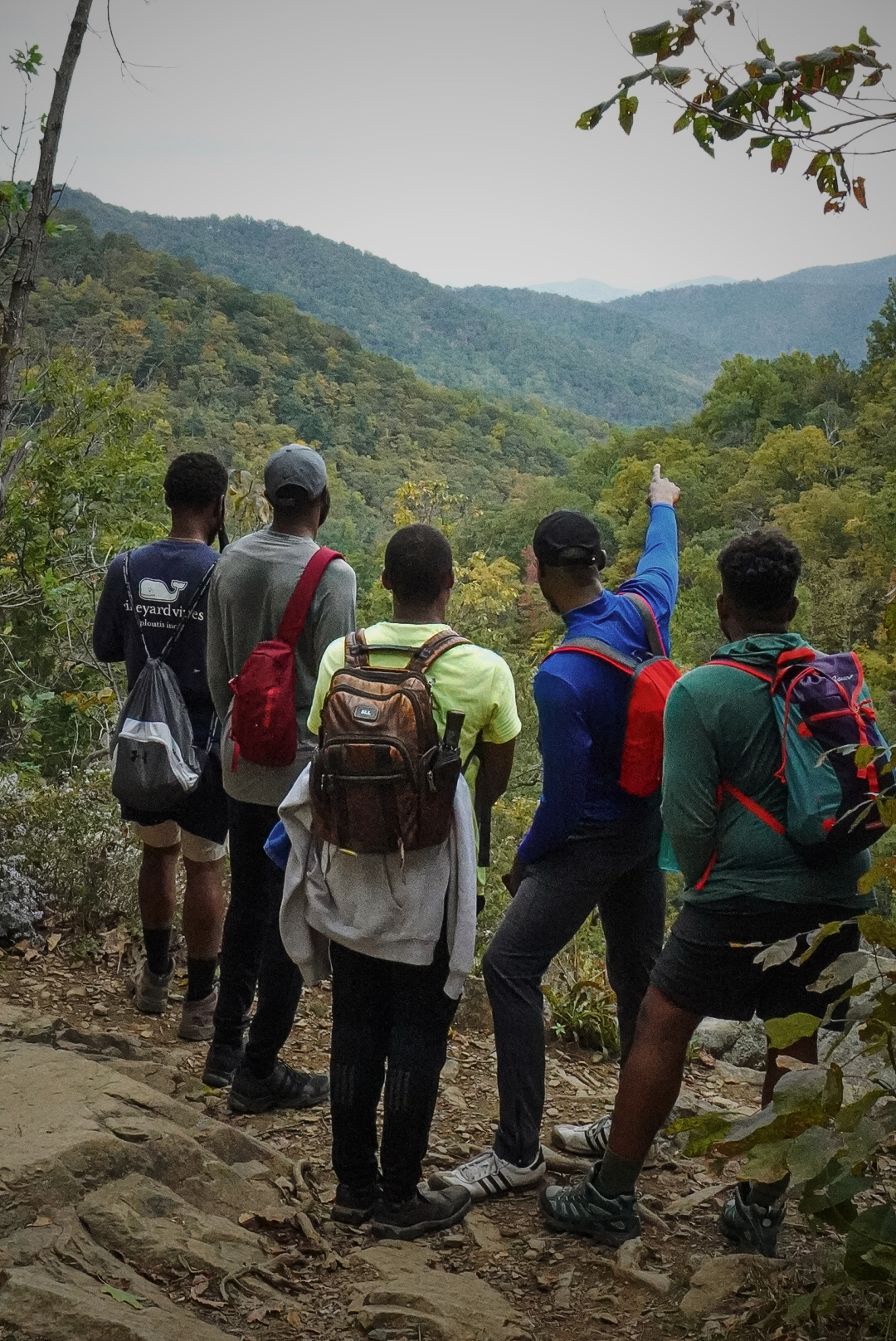Franklin D. Roosevelt once said, “There is nothing so American as our National Parks….the fundamental idea behind the parks is that the country belongs to the people.”
It’s a beautiful sentiment, this idea that our most breathtaking landscapes are there for all of us to experience, equally. But unfortunately, if there’s anything as American as the National Parks, it might be the sad reality that equality has not historically meant everyone. According to the National Park Service, nearly 77% of its visitors are white and only 7% are Black Americans. So while the founding principles of the parks may have been as a refuge for all, they’ve become yet another space without enough Black, Indigenous, and Person of Color (BIPOC) representation.
“Generally, being in the outdoors can be a very privileged, elitist, expensive sort of existence,” says Tyrhee Moore, the founder of Soul Trak, a D.C. based organization devoted to connecting marginalized people with the outdoors. “I’ve been very lucky to develop enough resources to gain access to these spaces that so many folks in my community haven’t been able to.”
Since launching Soul Trak in 2016, Moore has devoted his life to democratizing adventure — by providing the resources, experiences, and education to make public lands more accessible. And he’s gone on that journey, in part, because access to the outdoors changed his own life. Growing up in Washington D.C., the very community Soul Trak primarily serves, he took part in The City Kids Wilderness Project. Through the organization, he had the chance to visit Jackson Hole, Wyoming during the summer. It was a tradition he kept up through high school.
“That environment was drastically different than where I’d grown up in a very urban environment,” Moore says. “Being at home, playing, and being involved in very traditional team activities and sports, was the norm. But when I was in Jackson Hole, I was introduced to things like paddling or hiking or camping, and they pushed me individually — especially with developmental aspects around leadership, teamwork, perseverance, and risk-taking.”

Those summers sparked a passion in Moore for the outdoors. Being a climber and adventurer soon became not just a hobby but a vital part of his life. In 2013, at just 19 years old, Moore was invited to be a member of the first team of African American climbers to reach the summit of Denali, the highest point in the United States. This not only resulted in national attention and a visit to the White House, but solidified Moore’s path as an outdoor leader.
But even as an adventure expert, Moore found himself feeling isolated when he moved out west to be a nature guide.
“It can be pretty lonely if your community isn’t present on a regular basis,” he says. “As a guide, I was frequently leading clients and participants from specific backgrounds who may have never seen black authority or leadership. And so, in a lot of cases, there were moments of resistance or even questioning my credibility.”
Frustrated with the lack of representation of Black leaders in the outdoor sphere, Moore began to think about how he could change things.
“It became a question of how I could be most powerful in my position,” Moore says. “I knew that I wanted to dedicate myself to the things that I was really passionate about…create more space for others and not just myself.”
After working with other organizations that provided outdoor access to BIPOC in the mid-2010s, Moore founded Soul Trak as an intersectional environmental organization — aimed at bridging the gap between his community and outdoor spaces.
The first hurdle for Moore was figuring out why members of his community weren’t spending as much time in nature. He quickly discovered that the popular representations of “experiencing the great outdoors” — families skiing in the mountains or influencers living the #vanlife — wasn’t something his neighbors felt was possible for them.
“What we traditionally see on magazines or TV of nature, like mountains in Colorado and Montana, for a lot of our participants is completely unrealistic,” he says. “We can get locked into this one mold of what being in nature looks like, but they may never see snowcapped mountains. They may never get to visit Colorado. So we had to redefine what that looks like and how we connect to nature.”

Soul Trak started small, by organizing trips to hike, raft, and climb near D.C.. Moore’s stated goal was to meet people where they were at in their respective outdoor journeys. From synching up for painting events in public parks to picking up trash on trailheads — it wasn’t about the activity, it was about coming together as a community to enjoy the outdoors recreationally.
Along the way, Moore emphasized that there’s not just one way to commune with nature. Even when trips are adventure-based, there’s doesn’t need to be a high degree of pressure. He encourages participants to set their own goals and have their own experiences — whether or not they fit the conventional idea of how a space “should” be used. Recently, on a small climbing trip, he says of the eight participants, only four did any climbing.
The others spent the time discussing the books they had read during the pandemic.
“It’s been really important to try and knock down any pre-existing norms because I think that those are innately intimidating for folks who may not see themselves in the space currently,” he says. “For us at Soul Trak, it’s really important to let people come as they are and exist in a space in which they feel comfortable. We’re redefining how we exist in nature, because that is naturally going to look different for any one individual or community in regards to race, sex, gender, or geographics.”

As he builds a community of new outdoor adventurers, it’s also extremely important to Moore that he sets up a new generation of Black outdoor role models, something he wishes he had more of growing up. He remembers how thrilling and affirming it was when he climbed Denali, as the youngest team member, to see other African American outdoor adventurers. With this aim, Soul Trak has partnered with Howard University to empower young people to become environmental stewards and organizers.
With more community and representation, Moore hopes to inspire others to join him in creating more bridges for BIPOC to access outdoor spaces and take ownership of them. As George B. Hartzog, Jr., the NPS Director from 1964-1972, once said, “The national park idea has been nurtured by each succeeding generation of Americans. Today, across our land, the National Park System represents America at its best. Each park contributes to a deeper understanding of the history of the United States and our way of life; of the natural processes which have given form to our land, and to the enrichment of the environment in which we live.”
For too long, National Parks haven’t truly represented America at its best — because BIPOC have been left out of the conversation. But Moore hopes to change that for the next generation.
“We all play different roles in this whole intersectional movement of environmental stewardship,” he says. “It takes all of us to come together and understand that it’s going to take each individual to be stewards of our environment and stewards of our planet. When we’re looking at climate issues, when we’re looking at sustainability issues, who are we going to look to? It’s not one specific demographic, it’s not the current inhabitants of these spaces, we’re going to need everyone in our communities — both urban and rural.”







